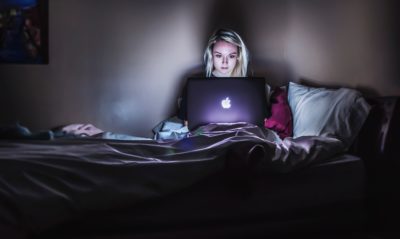Written by Sara Cooley MA, CCTP, LPC
August 22, 2022
It’s back to school season and time for teenagers to get back to those early mornings. Research shows that teenagers need between 8-10 hours of sleep per night. Hitting this recommendation assists in improving emotional well-being, creativity, attention span, physical health, and school performance. Sleep is essential for a teenager to perform their best. However, most polls show that they are missing this 8–10-hour mark by a wide margin: 45% of teenagers report getting less than 8 hours of sleep per night (Suni, 2022).
Why is 8-10 hours of sleep so difficult to achieve?

Partly to blame is biology. In addition to a teenager’s natural sleep drive occurring later than an adult’s, they experience a delay in melatonin, the “sleepy feeling” hormone. This organically doesn’t happen for teenagers until about 11PM-12AM! As we know, most school district start times happen much earlier than 8-9AM. Therefore, a teenager isn’t set up well to follow their natural sleep cycle and still arrive on time for school.
Screen time can also contribute to delay in sleep start. The light produced from phones can suppress melatonin and keep the brain active. Some studies show up to 89% of teenagers keep at least one electronic device in their room – a constant temptation for distraction and incoming notifications (Suni, 2022).
Lastly, between homework, socializing, sports, hobbies, chores, and work – there’s a lot of pressure to fit many activities in one day! Sleep usually is usually the first to suffer, even though it’s one of the biggest helps to organization, clarity, patience, and increased emotion regulation.
What are some ways to get better sleep?
-Allocate a routine that will encourage at least 8 hours of sleep. Try to keep it consistent weekdays AND weekends! Trying to “catch up” on the weekends only disrupts the routine.
-Avoid caffeine after 2PM.
-Stay off all electronics at least 30 minutes before bed. If the devices are going to stay, most devices now allow you to turn on “night mode” which can help with the incoming light.
-Keep your bedroom cool, dark, and quiet (or white noise).
-Create a bedtime routine that encourages relaxation & signals to your body it’s time for bed. Stretching, reading, or warm tea are great ideas.
-Use the bed only for sleeping. Complete homework at a desk, and watch TV or scroll on the phone sitting on a chair or couch.
-Refrain from naps after 3PM.
-Struggling to sleep? Practice slow breathing, body scan meditation. If 20 minutes passes, get up to complete a boring activity in dim lighting.
-Have pen & paper handy for writing down those pesky “to do” lists racing through your head.
-Eat healthy and exercise daily but refrain from intense exercise late at night.
-Seek help from a therapist trained in CBT-I (cognitive behavioral therapy for insomnia) to work with your thoughts surrounding sleep.
-Seek therapy for depression and anxiety related struggles.
If all else fails, try again tomorrow. Try sticking to habits and routine to retrain your body and brain towards good sleep habits.
Sources:
Suni, E. (2022, June). Teens and Sleep. Sleep Foundation. https://www.sleepfoundation.org/teens-and-sleep
